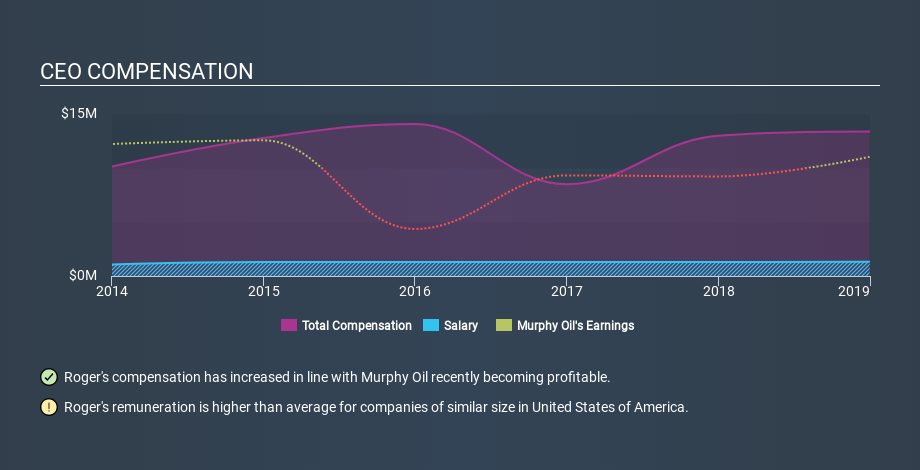How Much Did Murphy Oil Corporation's (NYSE:MUR) CEO Pocket Last Year?

In 2013 Roger Jenkins was appointed CEO of Murphy Oil Corporation (NYSE:MUR). This report will, first, examine the CEO compensation levels in comparison to CEO compensation at companies of similar size. After that, we will consider the growth in the business. Third, we'll reflect on the total return to shareholders over three years, as a second measure of business performance. The aim of all this is to consider the appropriateness of CEO pay levels.
Check out our latest analysis for Murphy Oil
How Does Roger Jenkins's Compensation Compare With Similar Sized Companies?
At the time of writing, our data says that Murphy Oil Corporation has a market cap of US$3.9b, and reported total annual CEO compensation of US$13m for the year to December 2018. While this analysis focuses on total compensation, it's worth noting the salary is lower, valued at US$1.3m. We note that more than half of the total compensation is not the salary; and performance requirements may apply to this non-salary portion. We looked at a group of companies with market capitalizations from US$2.0b to US$6.4b, and the median CEO total compensation was US$4.9m.
Thus we can conclude that Roger Jenkins receives more in total compensation than the median of a group of companies in the same market, and of similar size to Murphy Oil Corporation. However, this doesn't necessarily mean the pay is too high. A closer look at the performance of the underlying business will give us a better idea about whether the pay is particularly generous.
You can see, below, how CEO compensation at Murphy Oil has changed over time.
Is Murphy Oil Corporation Growing?
On average over the last three years, Murphy Oil Corporation has grown earnings per share (EPS) by 101% each year (using a line of best fit). Its revenue is up 74% over last year.
Overall this is a positive result for shareholders, showing that the company has improved in recent years. The combination of strong revenue growth with medium-term earnings per share improvement certainly points to the kind of growth I like to see. Shareholders might be interested in this free visualization of analyst forecasts.
Has Murphy Oil Corporation Been A Good Investment?
Given the total loss of 11% over three years, many shareholders in Murphy Oil Corporation are probably rather dissatisfied, to say the least. So shareholders would probably think the company shouldn't be too generous with CEO compensation.
In Summary...
We compared the total CEO remuneration paid by Murphy Oil Corporation, and compared it to remuneration at a group of similar sized companies. As discussed above, we discovered that the company pays more than the median of that group.
Importantly, though, the company has impressed with its earnings per share growth, over three years. Having said that, shareholders may be disappointed with the weak returns over the last three years. Considering the per share profit growth, but keeping in mind the weak returns, we'd need more time to form a view on CEO compensation. CEO compensation is one thing, but it is also interesting to check if the CEO is buying or selling Murphy Oil (free visualization of insider trades).
Of course, you might find a fantastic investment by looking elsewhere. So take a peek at this free list of interesting companies.
If you spot an error that warrants correction, please contact the editor at editorial-team@simplywallst.com. This article by Simply Wall St is general in nature. It does not constitute a recommendation to buy or sell any stock, and does not take account of your objectives, or your financial situation. Simply Wall St has no position in the stocks mentioned.
We aim to bring you long-term focused research analysis driven by fundamental data. Note that our analysis may not factor in the latest price-sensitive company announcements or qualitative material. Thank you for reading.

